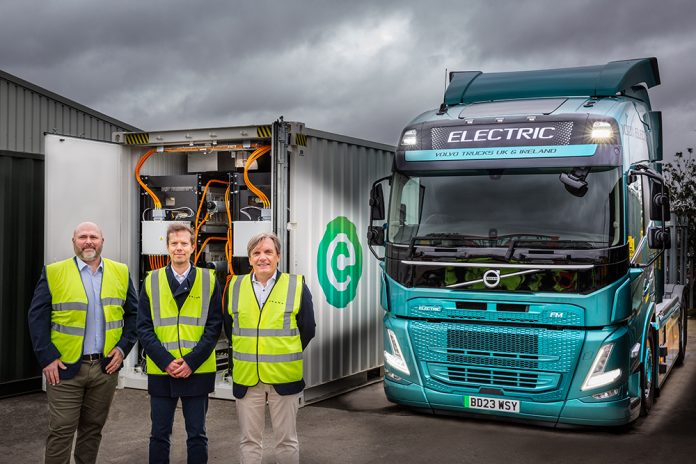Norfolk firm Connected Energy is supporting the global truck manufacturer with preparations for its all-electric HGVs.
Volvo Trucks UK & Ireland wanted to install high-powered charge points for battery-powered HGVs and buses at two service workshops in Carlisle and Enfield.
But neither site had a high enough import capacity from the grid to power the chargers.
All-electric trucks require charge points that can be up to 50 times more powerful than fast chargers for cars, placing a much bigger strain on energy supplies than car charging.
This leaves many organisations lacking the available electricity capacity to install the charging they require.
Connected Energy helped the two Volvo dealerships solve the issue – one of the biggest challenges faced in the UK’s shift to zero emission transport.
The specialist in second-life battery energy storage systems worked with each site to install an innovative 300kW E-STOR system. The systems provide enough power to ensure both facilities can run high-capacity charging points.
This entailed 350kW and five 22kW electric car chargers for courtesy cars and vans for Enfield, while Carlisle E-STOR will support a 150kW truck charge point and two 22kW electric car chargers for courtesy cars and vans.
Christian Coolsaet, Managing Director at Volvo Trucks UK & Ireland, said: “As a market leader in electric trucks, it is important that we can provide high-powered charging at key locations within our dealer network to support our customers whilst maintaining their electric trucks and buses. However, we are faced with grid capacity constraints at almost all our sites which is impacting our infrastructure plans.
“By installing Connected Energy’s battery energy storage systems, we can bring additional power onto the sites which helps us to move forward with the installation of high-powered charge points.
“The systems also support our wider net zero strategy to decarbonise our own workshop operations which includes investments in air source heat pumps, PV solar panels, energy efficient smart lighting systems and transitioning our service and parts van and courtesy car fleets to electric.
“London North will become one of our flagship carbon-neutral sites, generating its own power from a solar array with excess generation stored within the battery energy storage systems.”
How E-STOR works
E-STOR acts like an energy reservoir, storing power from the grid or on-site renewables during periods of low demand, and then releasing it during peak periods. In this way, it can help electric truck depots and service centres to offer high-capacity EV charging without worrying about grid connection constraints.
More than just batteries in a box, E-STOR has a sophisticated intelligent management system which means it can be programmed to respond to the energy demands on site. It can integrate with on-site solar arrays and is doing so at the Enfield site.
Because E-STOR uses second-life batteries from former EVs, it offers significant carbon savings compared to an energy storage system that uses new batteries. This aligns with Volvo’s drive to adopt circular economy business principles, particularly relating to the reuse of batteries.
Matthew Lumsden, CEO of Connected Energy, said: “Truck depots and service centres were not designed with EV charging in mind, so many of them are facing capacity issues as they look to extend their range into larger vehicles. E-STOR is often a more affordable alternative to expensive grid infrastructure upgrades – or in some cases the only option.
“We have seen an increase in enquiries as bus and truck operators begin to understand the lack of capacity on their sites and start to look for solutions to grid constraints.”
Powering on with new recruits
Connected Energy is bringing more quality jobs to Norfolk in response to new project wins.
As well as the successes with Volvo, it is part of a £30 million collaborative project recently announced by the Advanced Propulsion Centre (APC), supported by grant funding of £15m. The programme focuses on EV battery reuse, recycling and energy balancing. The consortium includes the Nissan Technical Centre Europe (NTCE) in Cranfield, Bedfordshire, battery producer AESC, and Altilium, a UK-based clean technology group focused on supporting the transition to net zero.
As part of the scaling up, Connected Energy has recruited seven new starters for its engineering team in Hethel, along with a further three at its Tyneside office.
Matthew said: “We are delighted to be delivering more quality engineering jobs in Norfolk as we continue to grow our team. These new appointments will enable us to further enhance our position as a global leader in second life energy storage systems.
“As we continue to develop exciting new partnerships, this brings fresh engineering challenges for us to solve. Expanding our teams will enable us to ensure our products can accommodate batteries from multiple manufacturers in a single system while still maintaining the high levels of performance that our clients expect.”




